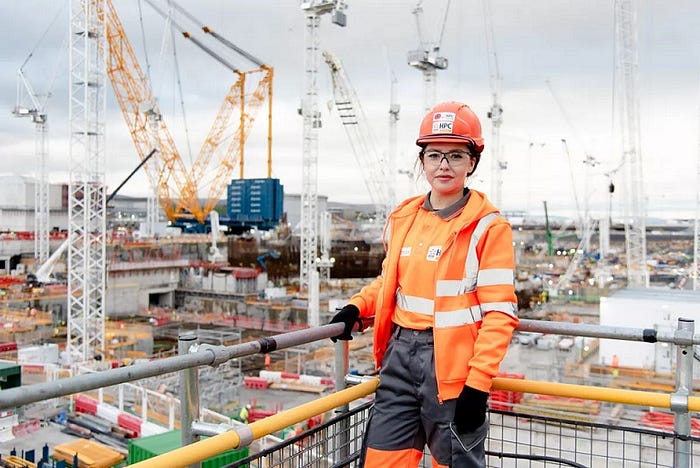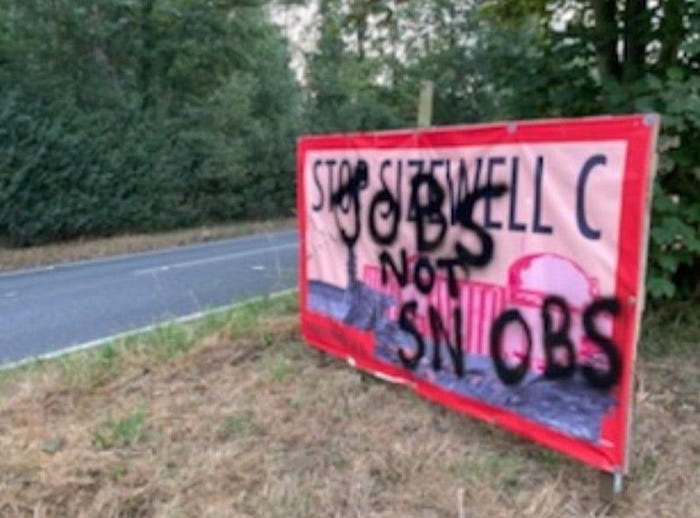Jobs Not Snobs: How Workers are the True Climate Heroes
--

I had an interesting childhood.
Many people are surprised to learn that I am from a working-class background. My parents migrated to the UK in the 1960s and 70s with the hopes of building a better life for the family they wanted to have. At the time Birmingham — known then as ‘the city of a thousand trades’ — was going through an industrial boom, with factories making everything from cars through pots and pans to electrical goods.
I remember clearly the smell of the freshly unwrapped frying pan, my mum lifting it carefully from its nest of paper in a large box for all to admire in our small kitchen. It was exciting because my parents had arrived in Britain with few possessions, because they had worked hard to be able to own such an item, and because this was a pan that my mother had helped to make with her own hands. And because by doing so she was able to help feed her family. She was understandably proud.
As a long-term environmentalist this appreciation for ‘consumerism’ has posed an obvious dilemma. I have advocated for living with less, and making objects as sustainably as possible, but equally I recognise that people need pots and pans and that — unfortunately — the more eco-friendly items often cost more. I know that we need to bring down greenhouse gas emissions, but my efforts have now shifted away from expecting ordinary people to shoulder this burden or to make drastic lifestyle changes. Instead I have become focused on advocating for cheap and abundant energy for everyone, which would solve many of our problems since global emissions are mostly from energy use.
Now let’s be honest: sustainable lifestyle changes are hardest for working class people. Owning a hybrid car or an electric bike, taking the train abroad rather than a much cheaper flight, buying quinoa instead of keema (an Indian dish made of ground meat), are predominantly middle-class choices — privileges — that require adequate income and time. I have long argued that it should be cheaper for people to make green choices, for example with more low-cost options for public transport, but what working class communities need first and foremost is reliable, well-paid jobs.
My grandfather was born and raised in the Punjab in India, and he fought for the British in World War Two. For years he was held as a Prisoner of War in Japan — my family thought he had died there. Instead he returned home unexpectedly, one of several thousand survivors, and with horrendous mental health issues including likely undiagnosed PTSD. Grandad would often see things that weren’t there and lash out at other villagers, but he was forgiven: Punjabi villagers understood that he had made this sacrifice to give his children the chance to build a better life. His son, my father, then left behind his home and family in search of economic stability and a higher quality of life for the children he wanted to have. They all made sacrifices in order to do the right thing for their children.
Manufacturing jobs were once the lifeblood of the British economy. Birmingham’s industry flourished in the three decades that followed the end of the Second World War: in fact it thrived even above other cities in Britain at the time, thanks to a combination of immigration, innovation and civic pride.
Growing up, I experienced what reliable jobs offered families like mine, and I also saw the heart of British industry stripped away as those jobs were increasingly outsourced abroad. Perhaps this has contributed to Britain’s current and ongoing identity crisis centred around ‘taking back control’ — although people don’t tend to include industry when they say this. ‘There are too many people, so there aren’t enough jobs’ I’ve been told, but these two statements do not necessarily correlate. There are too many unemployed people — because there are too few jobs. As migrants, these jobs gave my parents more than a higher quality of life and better future for their children: they also gave them a sense of belonging. Community. Pride.
My older brother, who would play with Lego with me for hours and who never seemed to tire of explaining the inner workings of, for example, a fridge to a curious 10-year-old, did not go to university when he reached 18 years of age. My parents were adamant that their children work instead (a trend I bucked when I hit 18, but that is another story). My brother took an apprenticeship to become an engineer, working his way up the ladder. Years later he helped to contribute to the design and building of some of Birmingham’s bigger landmarks, including the large university hospital and the redesign of the town centre. Can a child of immigrants contribute more significantly to their home than by building elements of the country with their own hands?
The recession began in 1980, with 20,000 redundancies a week announced — all in manufacturing — during a single month. As those opportunities disappeared, unrest grew. In 1968 the then-Wolverhampton MP Enoch Powell delivered his notorious Rivers of Blood speech, addressing disgruntled Brummies and putting the blame squarely on many of the pot makers and engineers. I had experienced the multicultural bounty of my city: as a child I’d watched Aston Villa football matches (we lived in the inner-city, near the stadium) and looked forward to the large gatherings celebrating Bonfire night, but I’d also anticipated the yearly mela in the park at Diwali. Hot dogs and candy floss at one event and samosas and laddoos at the other. These events were not segregated, and there was room for both.
I watched the balance erode. The collapse of Birmingham’s industrial economy was sudden and catastrophic — in 1976 the West Midlands region still had the highest GDP of any in the UK outside the South East, but within five years it was lowest in England. A foundation of Birmingham unravelled.
How much of the current state of affairs in Britain is due to this loss of industry? Economic downturn often leads to social and political unrest. In Britain at present, people are struggling to make ends meet and many parents can’t afford to feed their children even when working full time. Living wages are too low. The recent government announcement on the post-Covid recovery ‘Green Industrial Revolution’ could help tackle the problem by creating well-paid, secure, environmentally-sustainable jobs, but as announced it lacks ambition: for example it promises a mere 10,000 jobs through building nuclear, when simply approving the ‘oven-ready’ Sizewell C nuclear plant in Suffolk would support 70,000 manufacturing jobs throughout the UK, including 1,000 apprenticeships for young people.
When I visited Suffolk myself to ask people what they think of the proposed nuclear power station, 9 out of 10 locals I spoke to mentioned jobs, including opportunities for their young people who will, without said jobs, move away. This is partly why the unions Unite, GMB, and Prospect are backing the construction of Sizewell C.
It’s also why local residents have graffitied anti-Sizewell posters that were erected around Leiston this year.

It makes me uncomfortable to see opposition to well-paid job opportunities from celebrated individuals like actor Bill Nighy who owns a second-home in Suffolk and ex-broadcaster Bill Turnbull who is also vocally against Sizewell C. It is telling that Turnbull does not mention jobs in his commentary against the power plant.
This sort of activism comes from a privileged position from those with the means, time and public platform to share their views, such as celebrities. Many ordinary workers lack the time and ability to do the same, yet they are making a significant contribution to society. Heads down, working with their hands, they are getting on with the job.
The idea implied in climate activism that working-class people don’t care about the planet, while those with hybrid cars do, is unfair and incorrect. Many of the workers who choose to take jobs at nuclear plants do so because they care about the planet and their children’s futures, just as my parents and grandparents cared about mine.
Workers in the nuclear industry also experience stigma, from mild mockery engendered by The Simpsons caricature, to the outright enmity of the anti-nuclear movement in Germany. But they are in fact doing immense good in the world, and they do so without the glory. Yes, they want jobs, but they want good jobs too, and jobs that make our world a better place.
The recent collapse of the proposed Wylfa nuclear power plant was a blow to Anglesey and North Wales. MPs and council members across the region aired their disappointment, with Shadow Minister for Climate Change, Energy and Rural Affairs Janet Finch-Saunders stating: “This is a real blow for North Wales and for the talented and skilled workforce that would have been developed and employed in all phases of the plant’s construction and operation, had it gone ahead.” Reports have also found that the UK’s poorest will be hardest hit by climate change.
For me, new nuclear plants provide a tidy outcome: I want to see a return of community to Britain’s streets, for hardworking people to enjoy candy floss and samosas without increasingly fighting among themselves. I also want to advocate for sustainable work options, and building nuclear ticks the box nicely.
Politicians and celebrities can debate climate policies until the cows come home, but the reality is that working-class labourers will deliver what Britain needs to address rising emissions, and therefore the climate emergency. Yes, those in power need to sign the documents, but the hands that built these cities are the ones that will save the world.
